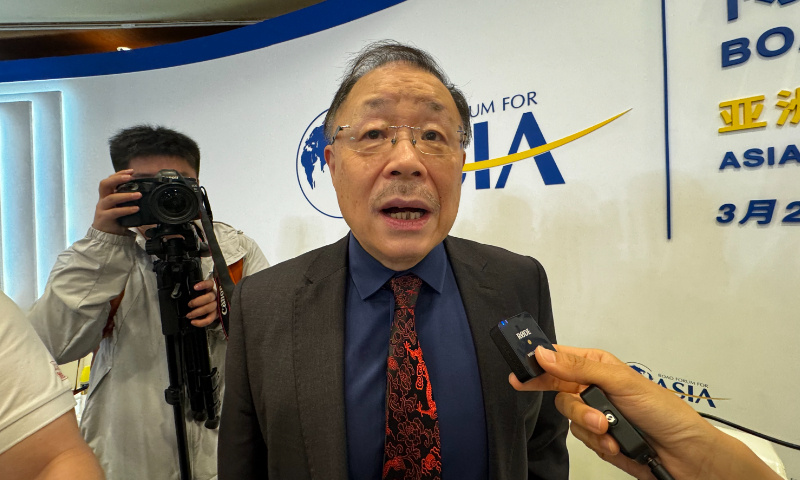
Zhang Keke, director of the Macau Institute of Space Technology and Application, speaks with the Global Times during a session of the Boao Forum for Asia in Hainan on March 26, 2024. Photo: Liu Caiyu/GT
Experts have expressed excitement about the potential for artificial intelligence (AI), at the Boao Forum for Asia in South China's Hainan Province. Zhang Keke, director of the Macau Institute of Space Technology and Application, told the Global Times that Mars could be transformed into a habitable planet for humans with the help of AI.
Zhang said that Mars used to have water and an atmosphere, just like Earth, but Mars has evolved faster. In a sense, today's Mars represents the future of the Earth.
"If we humans can go to Mars and transform it with the help of modern technologies such as AI, we might be able to transform the environment of Mars so that humans can live there, which would represent a very important starting point for a breakthrough moment in the technological revolution," Zhang said during a session at the Boao Forum for Asia on Tuesday.
"If we want Mars to reboot and return to a state of life, then we must find a way to restart its internal generator. I believe we will be able to realize this goal through AI technology in the future," Zhang noted.
"It may not be science fiction. Humans could improve the environment on Mars, making it have air and water again, so that humans can live there. If this happens, it will solve many of the troubles faced by humans," Zhang said. He added that humans face a lack of resources and land, which is why they have been exploring the moon and other celestial bodies for many years.
Various ideas have been put forward by scientists to recreate the magnetic field of Mars, Zhang noted. He said that when there is a magnetic field, it acts like an umbrella and blocks solar wind, allowing the environment to become suitable for the development of water, air and human life.
China's spatial research and development is already on this path, according to Zhang. He mentioned the Tianwen-1 probe that landed on Mars. This was the first time that human beings have carried out an exploration of the magnetic field on Mars.
The Tianwen-1 probe consists of an orbiter, a lander and a rover. On May 15, 2021, it touched down at its pre-selected landing area in Utopia Planitia, a vast Martian plain, marking the first time that China has landed a probe on the planet. A week later on May 22, 2021, the Mars rover Zhurong, which resembles a butterfly, drove down from its landing platform to the Martian surface, according to Xinhua News Agency.
China's exploration of Mars will be further accelerated with the development of AI, Zhang told the Global Times. He said that in 2028, China will launch a second spacecraft called Tianwen-3, which will take samples from Mars and bring them back to Earth. Macao will strive to play a part in this research, Zhang noted.
"As we all know, China recently successfully launched a relay satellite to the moon, allowing humans to explore the far side of the moon. Therefore, I feel that with powerful tools like AI and machine learning methods, humans will greatly increase the speed of exploration of resources on Mars and especially the moon in the future," Zhang noted.
During the session, Max Yuan, chairman of Xiao-i Corporation, also shared his views on breakthroughs in technology. He emphasized the importance of integrating AI into our daily lives, as it has become ubiquitous in all aspects of society.
Yuan posed a thought-provoking question: Is our work life more akin to that of a machine or a human? He suggested that these are the existential questions facing humanity.
Yuan also stressed the necessity of embracing AI in every industry and emphasized the importance of staying ahead in the technological race, highlighting the significance of utilizing AI faster than others to maintain a competitive edge.
But Kyoung Mu Lee, a professor at Seoul National University, said that singularity, or the point at which AI becomes more intelligent than humans, will arrive faster than most people think.
A survey in 2017 indicated that most people predicted it would occur between 2045 and 2090, with 2060 being the most likely year for the technological singularity to occur. However, as the development of AI is progressing at an unprecedented speed, and true AI is beginning now, Lee believes the singularity will happen within five years.
He said that previously, ChatGPT was just a talking machine, but true transformation comes from multimodal, multitasking, embedded AI that can be integrated with any machine, such as cars and robots.
Disruptive technologies such as artificial intelligence, quantum computing, and nuclear fusion have strong synergistic effects when combined. When these three factors are placed together, we will have true singularity for AI, Lee told the audience.

